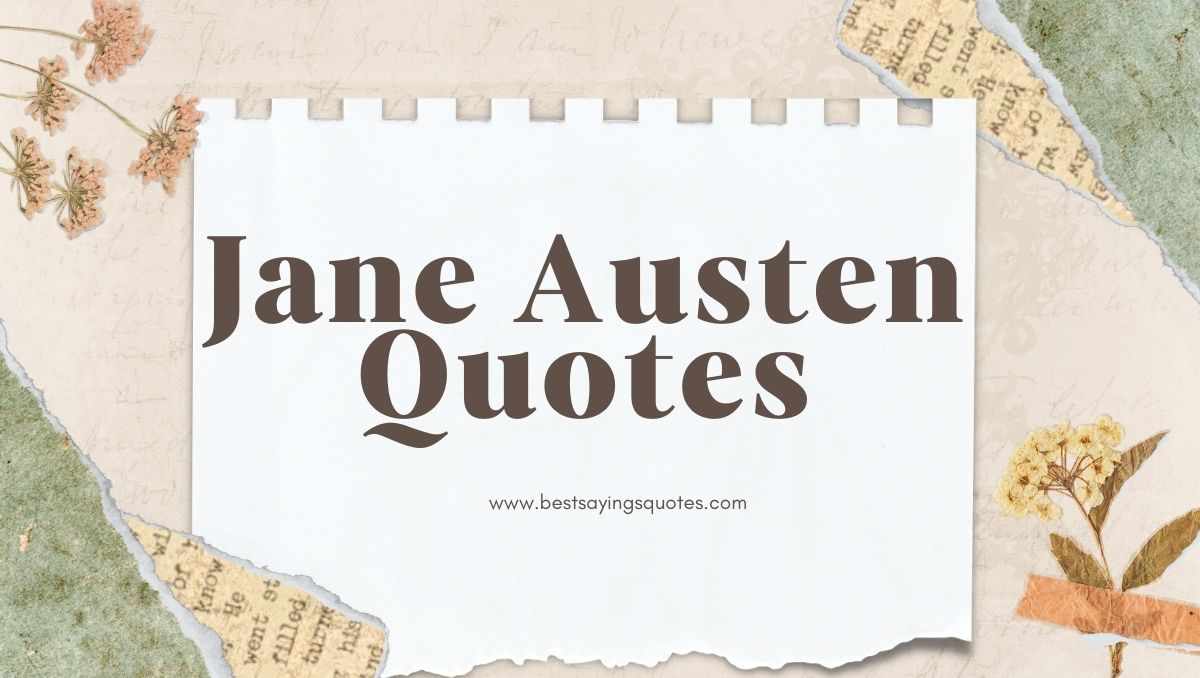Jane Austen was one of the most influential and beloved writers of English literature. She is best known for her six novels: Sense and Sensibility, Pride and Prejudice, Mansfield Park, Emma, Northanger Abbey, and Persuasion. She also wrote several letters, poems, and unfinished works.
Jane Austen’s novels are famous for their witty and ironic commentary on the society, manners, and morals of her time. She created memorable characters, realistic dialogue, and engaging plots that explored themes such as love, marriage, family, friendship, class, and gender.
Famous Jane Austen Quotes
Jane Austen’s quotes are often quoted and admired by readers and writers alike. They reflect her keen observation, sharp wit, and profound insight into human nature. Here are some of the best Jane Austen quotes from her novels and letters:
– “It is a truth universally acknowledged, that a single man in possession of a good fortune, must be in want of a wife.” (Pride and Prejudice, 1813)
– “The person, be it gentleman or lady, who has not pleasure in a good novel, must be intolerably stupid.” (Northanger Abbey, 1817)
– “There is nothing I would not do for those who are really my friends. I have no notion of loving people by halves, it is not my nature.” (Northanger Abbey, 1817)
– “I declare after all there is no enjoyment like reading! How much sooner one tires of any thing than of a book!” (Pride and Prejudice, 1813)
– “A lady’s imagination is very rapid; it jumps from admiration to love, from love to matrimony in a moment.” (Pride and Prejudice, 1813)
– “In vain have I struggled. It will not do. My feelings will not be repressed. You must allow me to tell you how ardently I admire and love you.” (Pride and Prejudice, 1813)
– “I do not want people to be very agreeable, as it saves me the trouble of liking them a great deal.” (Jane Austen’s Letters, 1798)
– “The more I know of the world, the more I am convinced that I shall never see a man whom I can really love. I require so much!” (Sense and Sensibility, 1811)
– “It isn’t what we say or think that defines us, but what we do.” (Sense and Sensibility, 1811)
– “There is no charm equal to tenderness of heart.” (Emma, 1815)
– “Her own thoughts and reflections were habitually her best companions.” (Mansfield Park, 1814)
– “Life seems but a quick succession of busy nothings.” (Mansfield Park, 1814)
– “Selfishness must always be forgiven you know, because there is no hope of a cure.” (Mansfield Park, 1814)
– “A large income is the best recipe for happiness I ever heard of.” (Mansfield Park, 1814)
– “Is not general incivility the very essence of love?” (Pride and Prejudice, 1813)
– “Nothing ever fatigues me, but doing what I do not like.” (Mansfield Park, 1814)
– “You must learn some of my philosophy. Think only of the past as its remembrance gives you pleasure.” (Pride and Prejudice, 1813)
– “Angry people are not always wise.” (Pride and Prejudice, 1813)
– “I hate to hear you talk about all women as if they were fine ladies instead of rational creatures. None of us want to be in calm waters all our lives.” (Persuasion, 1817)
– “Where so many hours have been spent in convincing myself that I am right, is there not some reason to fear I may be wrong?” (Northanger Abbey, 1817)
– “To sit in the shade on a fine day and look upon verdure is the most perfect refreshment.” (Mansfield Park, 1814)
– “Surprises are foolish things. The pleasure is not enhanced, and the inconvenience is often considerable.” (Emma, 1815)
– “One half of the world cannot understand the pleasures of the other.” (Emma, 1815)
– “One man’s style must not be the rule of another’s.” (Emma, 1815)
– “One cannot be always laughing at a man without now and then stumbling on something witty.” (Pride and Prejudice, 1813)
– “One does not love a place the less for having suffered in it, unless it has been all suffering, nothing but suffering.” (Persuasion, 1817)
– “One cannot fix one’s eyes on the commonest natural production without finding food for a rambling fancy.” (Mansfield Park, 1814)
– “One half of the world cannot understand the pleasures of the other.” (Emma, 1815)
– “One man’s ways may be as good as another’s, but we all like our own best.” (Persuasion, 1817)
– “One cannot be always laughing at a man without now and then stumbling on something witty.” (Pride and Prejudice, 1813)
– “One does not love a place the less for having suffered in it, unless it has been all suffering, nothing but suffering.” (Persuasion, 1817)
– “One cannot fix one’s eyes on the commonest natural production without finding food for a rambling fancy.” (Mansfield Park, 1814)
– “One man’s ways may be as good as another’s, but we all like our own best.” (Persuasion, 1817)
– “Oh! Do not attack me with your watch. A watch is always too fast or too slow. I cannot be dictated to by a watch.” (Mansfield Park, 1814)
– “Nobody minds having what is too good for them.” (Mansfield Park, 1814)
– “No one can be really esteemed accomplished who does not greatly surpass what is usually met with.” (Pride and Prejudice, 1813)
– “My idea of good company…is the company of clever, well-informed people, who have a great deal of conversation; that is what I call good company.” (Persuasion, 1817)
– “Men have had every advantage of us in telling their own story. Education has been theirs in so much higher a degree; the pen has been in their hands. I will not allow books to prove anything.” (Persuasion, 1817)
– “Let other pens dwell on guilt and misery.” (Mansfield Park, 1814)
– “Laugh as much as you choose, but you will not laugh me out of my opinion.” (Pride and Prejudice, 1813)
– “It sometimes happens that a woman is handsomer at twenty-nine than she was ten years before.” (Persuasion, 1817)
– “It is very difficult for the prosperous to be humble.” (Emma, 1815)
– “It is not time or opportunity that is to determine intimacy; it is disposition alone. Seven years would be insufficient to make some people acquainted with each other, and seven days are more than enough for others.” (Sense and Sensibility, 1811)
– “It is not everyone who has your passion for dead leaves.” (Sense and Sensibility, 1811)
– “It is a very difficult thing to tell the truth, and yet it is what we must do.” (Mansfield Park, 1814)
– “It is a truth universally acknowledged, that a single man in possession of a good fortune, must be in want of a wife.” (Pride and Prejudice, 1813)
– “It is always incomprehensible to a man that a woman should ever refuse an offer of marriage.” (Emma, 1815)
– “Indulge your imagination in every possible flight.” (Pride and Prejudice, 1813)
– “If I loved you less, I might be able to talk about it more.” (Emma, 1815)
– “I wish, as well as everybody else, to be perfectly happy; but, like everybody else, it must be in my own way.” (Sense and Sensibility, 1811.


3 thoughts on “Jane Austen Quotes: Reflections on Love and Life”
Comments are closed.